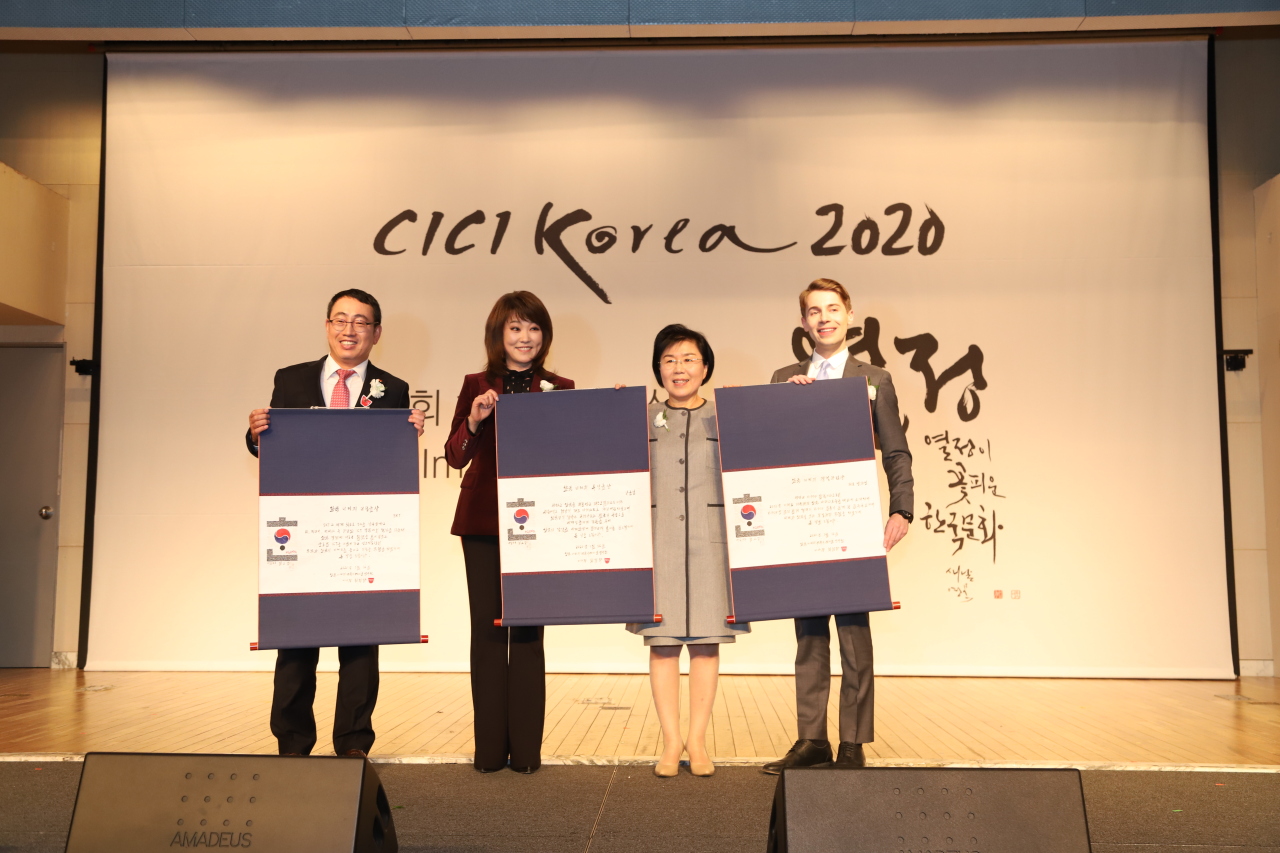CICI recognizes SK Telecom, K-pop writer Benjamin, jazz singer Nah for contributions to Korea’s image
83 percent of foreign survey respondents associate Korea with conglomerates, 85 percent cite synchronized dance as top reason for K-pop’s popularity
By Park YunaPublished : Jan. 14, 2020 - 21:08
Mobile carrier SK Telecom, K-pop columnist Jeff Benjamin and jazz vocalist Nah Youn-sun were awarded the Corea Image Communication Institute’s Korea Image Awards on Tuesday for their contributions to building a positive image of South Korea at home and overseas.
At the awards ceremony held at the InterContinental Seoul Coex, SK Telecom Vice President Yoo Young-sang received the Korea Image Stepping Stone Award on behalf of the mobile carrier for its efforts to commercialize 5G technology worldwide. Nah, an acclaimed jazz singer well known in Europe, received the Korea Image Fire Stone Award.
At the awards ceremony held at the InterContinental Seoul Coex, SK Telecom Vice President Yoo Young-sang received the Korea Image Stepping Stone Award on behalf of the mobile carrier for its efforts to commercialize 5G technology worldwide. Nah, an acclaimed jazz singer well known in Europe, received the Korea Image Fire Stone Award.

“SK Telecom is putting so much efforts into spreading Korea’s technology and (starting) a new K-Wave based on 5G technology,” said Yoo. “We will keep up our work to raise Korea’s status to a higher level.”
“As (suggested by) the name of the award -- ‘Fire Stone,’ which is used to cause a bigger fire -- I hope my passion for jazz music will have a bigger impact globally on building a positive image of Korea,” said Nah.
The Korea Image Stepping Stone Bridge Award went to K-pop columnist Jeff Benjamin for his efforts to introduce K-pop artists to the world, serving as a bridge between the artists and the global audience.
About 600 foreign envoys and guests attended the gala event. They included US Ambassador Harry Harris, Japanese Ambassador Koji Tomita, British Ambassador Simon Smith, Singaporean Ambassador Eric Teo Boon Hee and Kuwaiti Ambassador Bader Mohammad Al-Awadi.
“Every day, more and more people are listening to Korean music, watching Korean films and learning Korean language,” said US Ambassador Harry Harris at the event. “We are here tonight to recognize several outstanding individuals who played a leading role in the global phenomenon known as the Korean Wave.”
CICI, a nonprofit organization dedicated to promoting Korea’s image abroad, has annually honored cultural figures, organizations and objects that have helped spread a positive image of Korea. Past award winners have included former United Nations Secretary-General Ban Ki-moon, golfer Pak Se-ri, and YouTubers Josh Carrott and Ollie Kendal.
The event was supported by the Ministry of Foreign Affairs; the Ministry of Culture, Sports and Tourism; and the Korean Culture and Information Service.
“I have led the institute for 20 years to promote positive images of Korea to the world, and I feel proud to see the number of nominees increase every year,” said Choi Jung-wha, president of CICI, who is also a professor at Hankuk University of Foreign Studies. “2020 is the Year of the White Rat. I hope people manage difficulties wisely like a white rat and that everything goes well.”
The results of the institution’s survey of 299 foreigners and 230 Koreans on Korea’s image, conducted Nov. 15 through Jan. 7, were released after the awards ceremony.
Asked what came to mind when they heard the name Korea, 83 percent of foreign respondents said they thought of conglomerates such as Samsung, LG and the Hyundai Motor Group, while 70 percent of Korean respondents chose the word “entertainment.”
Both Korean and foreign respondents chose “perfectly synchronized dance” as the top reason for the global popularity of K-pop. Among foreigners, “idols’ looks” followed while “touching lyrics and message” came next among Korean respondents. Also, 93 percent of foreigners said “innovative music” was needed to sustain people’s interest in K-pop globally.
For the most competitive Korean video content in the world market, 88 percent of foreign respondents chose movies. Drama and “meokbang” -- online streaming broadcasts in which the host eats on camera -- followed at 28 percent and 16 percent, respectively.
About 57 percent of the foreign respondents said they had held negative opinions about excessive education fever in Korea before coming to Korea, while 35 percent said they had held negative opinions about rigid labor unions in the country.
Europeans, 28.39 percent, accounted for the largest portion of the survey respondents, followed by respondents from North America at 24 percent. Respondents from Asia, Oceania, Africa and South America accounted for 15 percent, 11 percent, 11 percent and 10 percent of the respondents, respectively.
By Park Yuna (yunapark@heraldcorp.com)

















![[KH Explains] Hyundai's full hybrid edge to pay off amid slow transition to pure EVs](http://res.heraldm.com/phpwas/restmb_idxmake.php?idx=652&simg=/content/image/2024/04/18/20240418050645_0.jpg&u=20240418181020)

![[Today’s K-pop] Zico drops snippet of collaboration with Jennie](http://res.heraldm.com/phpwas/restmb_idxmake.php?idx=642&simg=/content/image/2024/04/18/20240418050702_0.jpg&u=)